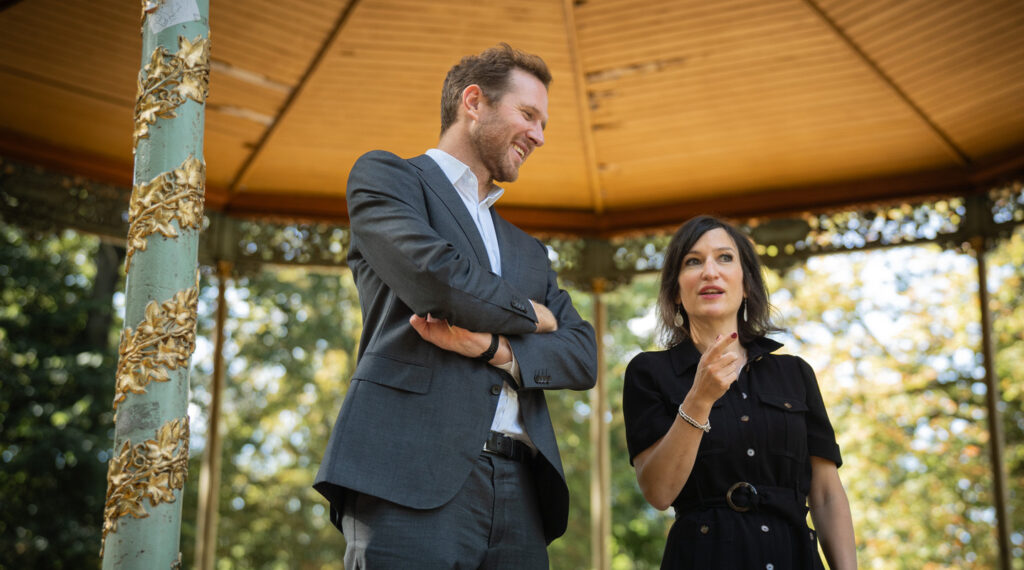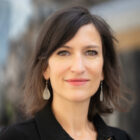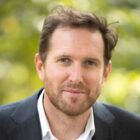Trust in the future – looking ahead to a philanthropic world in transition

The annual Philea Forum will be hosted in 2024 in the city of Ghent by the King Baudouin Foundation. Brieuc Van Damme (BVD), who has been CEO of the Belgian institution for a little over a year, sat down with Delphine Moralis (DM), who has led the Philanthropy Europe Association (Philea) in Brussels since its creation in 2022, to discuss key issues for the sector as it marks the European Day of Foundations on 1 October.
Philanthropy is changing fast. What are the key issues for the Forum, that European foundations have to get right in the coming years?
DM: For me there are two main issues:
Trust: there are concerning signs of a crisis in trust – in institutions, in democracy – which has only increased with fake news, fast developments in AI, polarisation etc. Young people are among those whose trust in democracy and society has decreased over the past years, and this is worrying.
Trust is very important for philanthropy – it is linked to our licence to operate. It has a lot to do with philanthropic practices: it will be important for our sector to continue on the path started during the pandemic of listening to grantees, finding balanced and meaningful ways for measuring and evaluation, providing flexible funding etc.
Taking into account the challenges faced by society: it will be very important for philanthropy to live up its potential, and to the high expectations we have towards ourselves in terms of being risk takers, innovators, agility and long-term thinkers. We need to walk the talk, realising the potential of philanthropy and its diverse capabilities.
BVD: Absolutely! Because we can take risks, because we are agile, philanthropic organisations should be key actors in this transition from the old world to a new one. At the same time – and this resonates with your point about people losing faith in our institutions – most people are not comfortable with change. So, it’s our responsibility, in coming up with new social models, to involve everybody, especially people who feel left behind or unheard, to strike a balance, to make sure that we offer people that trust in the future.
There are also new philanthropic tools to involve the next generations, there are new technologies, there are new legal frameworks at European level. All that creates momentum and it’s our responsibility now to to capitalise on that. So, the Philea Forum in Belgium comes at a very timely moment.
DM: I love that combination of momentum and responsibility! With the freedom that we have to use our limited capital wisely, we also have a responsibility to be very brave.
BVD: And trust also means we ourselves need to be more accountable, more transparent. There’s margin for improvement!
The Forum is being held in Belgium at a political moment. There are elections in June to the European Parliament, bringing a new Commission. And Belgium, which also holds a legislative election, will take the presidency of the EU Council for six months from January. What political priorities would you like to see?
BVD: European governments should work more together – and foundations also need to be able to work together more. Philea is an ideal partner to advocate for putting the single market for philanthropy higher on the legislative agenda.
I also hope that after the European – and Belgian – elections in June, policymakers will prioritise restoring faith in our democratic institutions and environmental sustainability.
DM: The single market for philanthropy is absolutely important. EU institutions have been waking up to the power and the value of philanthropy. Following up on the 2021 Social Economy Action Plan, a European Council Recommendation proposal published on 13 June specifically called for overcoming barriers to cross-border philanthropy, and there is also a Proposal for a European Cross-Border Association, which could save associations up to 770 million euros a year. So that’s exciting! But there are so many barriers still to cross-border philanthropy. And we are hopeful the institutions will tackle them.
Aside from that legal framework, policymakers can also tap into the intangible assets of philanthropy, the knowledge, the networks, the expertise, the closeness to society. Philanthropy could bring more if it was invited to co-create and be a real partner of the institutions, based not only on financial but also non-financial resources.
BVD: The point you make about our transaction costs is key, because that means indeed, more money can go to the projects instead of to the structures. That means changing legislation to enable foundations to work better together.
A single market in philanthropy, promoting cross-border giving, implies governments extending tax breaks to citizens who want to send money abroad. How do you persuade them that this is in their national interest?
BVD: It’s not zero sum. Taxes are absolutely necessary, of course. But we should look at all the resources going to public goods as a whole, whether through taxes or private resources, not as one or the other. As foundations, we should show our value added in making the cake bigger for public objectives.
DM: We, of course, should all be paying our taxes. But I do think that there is value, especially in the complexity that we’re facing, in having a plurality of tools, and philanthropy adds to that plurality. And I think that’s interesting and valuable, also ultimately for the taxpayer – and also at the European level, with a single market for philanthropy.
You’re speaking about greater cooperation between public agencies and private philanthropists. What could that greater collaboration look like?
DM: There’s momentum behind what we call PPPP – with philanthropy added as an extra P to Public-Private Partnerships. There’s a multitude of ways in which philanthropy can contribute as co-grantors, co-investors, and also, as partners around the table to think about what works for the communities that we serve. There’s a proximity that philanthropy has to citizens, and that European institutions can benefit from if we’re having conversations, not at the time when the cheque has to be put on the table but already when we’re thinking of what could work for citizens and for society as a whole. I’m hoping to see more openness, more dialogue and more creative, collaborative tools.
BVD: These last few years have brought the potential added value of foundations even more into the picture. At KBF, for example, we helped hospitals experiment with using scuba gear to treat early Covid patients and a trust-based system of fast emergency grants for people hit by the 2021 Belgian floods was taken up and copied by the public sector.
We showed that beautiful complementarity that I think we’re all looking for.
Another example: in disasters, foundations like ours can also play a role in the long-term, when the first attention fades and reconstruction needs to start.
DM: I so agree! Just days after war broke out in Ukraine, our Philea members convened to discuss, first, how to get real help to the local communities dealing with the early problems on the ground – before the big international humanitarian organisations could get established – and second, how to reconstruct the country afterwards.
BVD: I love what you guys at Philea did, where you’re coordinating where the grants are going and finding a way around funding bottlenecks. We’re completing public action, but we’re also completing the humanitarian response.
DM: Yes, even if philanthropic actors are not traditionally emergency responders. Our value has lain in patient capital and long-term thinking. But with crises increasingly being the norm, we’re now increasingly asked to do both.
Aside from public authorities, collaborations between private businesses and philanthropists are also on the rise. Where do you see that heading?
DM: First, I think we need every sector to be engaged in solving today’s problems. And sustainable private investments deliver increasingly good market returns. That’s really good news.
Secondly, we’re also seeing more hybrid forms of philanthropy, such as enterprise foundations, which both run their business and pursue philanthropic purpose.
And then third, we see more foundations wanting to look at impact investing and to align their own investments with their mission.
It’s good news that more sectors are seeing the value of contributing to an agenda of sustainability..
BVD: We’ve seen a tremendous growth of corporate philanthropy since Covid, especially from multinationals. That’s positive. But this can’t be greenwashing or rainbow-washing or whatever. We have refused to work with companies when their actions are not sufficiently aligned with our values. We have to be able to say no.
And, as you say, impact investing by foundations, is becoming huge. It’s a way to double our impact. Through an investment vehicle called Pluralis, for example, we take shares in media companies in European countries where media independence is fragile. And we use our dividends to fund grants in support of other democracy initiatives.
DM: I’m also excited when foundations try to change companies’ policies by using their voice as a shareholder from within.
BVD: Absolutely. It’s new for us, and we don’t have the skill sets in-house as yet to play that role fully. But it will become more and more important.
You both bring public-sector insight to your roles. Delphine, you’re also president of the Belgian international development agency Enabel, and Brieuc, you previously ran the Belgian public health insurance system. How do those experiences inform your work today?
BVD: Having been on the other side of the table, I hope to have a better understanding of what policymakers expect from organisations like ours. One thing is to offer concrete proposals. Also, to empathise with the fact that your sector is just one of myriad interests that policymakers need to take into account. Ask for something that serves their agenda. And finally, be discreet in our advocacy. In the end, it’s policymakers who need to make that systemic change happen. It’s their fight. So let them have the credit.
DM: What this experience brings me for my work at Philea is a keen understanding of the uniqueness of philanthropic capital. Compared to organisations working with taxpayers’ money, philanthropic organisations have the possibility to be so much more agile, to try out bold new ideas, to think with long term horizons. This is a real asset.
BVD: Oh, absolutely! Of course, we are also more exposed if our decisions don’t work out. When it rains it pours. Fortunately, I don’t mind getting wet!
DM: And that’s okay, right? If you never get rained on, it might mean that you haven’t taken the risks that we talked about being necessary in philanthropy.
Finally, you’re welcoming the 2024 Philea Forum to Belgium. As two locals, what can Belgium offer to the European philanthropy sector – apart, of course, from the famous good humour and hearty cuisine!?
DM: Because we’re in a complex situation as a country, embracing complexity and a diversity of views to find consensus is something that I think we have in our DNA.
I hope also that as Belgians we bring humility to philanthropy. I think it’s so important to be humble, and to be aware of the privilege we have to be doing these jobs.
BVD: Indeed. And because we’re sort of at the buffer between the North and the South that makes us maybe a little bit more pragmatic, easy to work with, creative for sure, to find ways around, to try to find consensus.
DM: And, of course, the beer and chocolate helps too!
Authors


